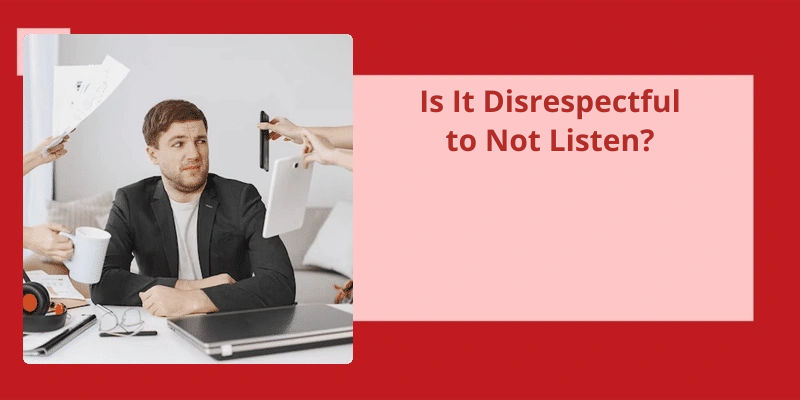Human beings are complex creatures, and their behavior can’t be fit into neat little boxes. One behavior that’s often attributed to disrespect is failing to listen. Whether it's a child who refuses to pay attention or an adult who seems distracted, not listening is often seen as a sign of disrespect. However, the truth is that there can be many factors behind someone's failure to listen. Children, in particular, are still trying to make sense of the world around them, and their behavior can be influenced by a variety of internal and external factors. In order to truly understand why someone isn’t listening, it's important to consider all of these factors and approach the situation with empathy and understanding.
What Happens When You Don’t Listen to Someone?
Not listening, on the other hand, can result in communication breakdowns, misunderstandings, and even conflict. When you don’t listen to someone, it can make them feel ignored, disrespected, and unimportant. This can have negative consequences on your relationships, both personal and professional. You may miss out on opportunities to connect with others and build meaningful relationships.
Not listening can also impact your own personal growth and development. By not listening to feedback from others, you may miss opportunities to improve yourself and learn from your mistakes. You may also fail to recognize your own limitations and blind spots, which can hinder your progress and success.
In some cases, not listening can have serious consequences. For example, in a healthcare setting, not listening to a patients symptoms or concerns could lead to a misdiagnosis or other medical errors. In a business setting, not listening to feedback from customers or stakeholders could lead to lost sales and revenue.
This can limit your own understanding of the world and prevent you from growing and learning. It’s important to approach every conversation with an open mind and a willingness to listen, even if you don’t agree with the other persons views. By doing so, you can build stronger relationships, expand your knowledge, and improve your own personal and professional development.
It’s a frustrating experience when someone doesn’t listen to us. It’s not always easy to understand why they choose not to pay attention to what we’ve to say. However, we can often attribute it to certain negative attributes such as pride or defensiveness. In order to better understand how to deal with these situations, we asked you to share your own tips and tricks for handling people who aren’t willing to listen. Here’s what you’d to say.
Why Do People Choose Not to Listen?
The act of not listening can be attributed to a variety of factors. In some cases, it may be indicative of arrogance or pride, with individuals believing that they already know everything and that they don’t need to listen to anyone else. In other cases, it may be the result of defensiveness, with individuals guarding themselves against criticism or feedback. Similarly, an unwillingness to admit to mistakes may also contribute to a lack of listening, as individuals may feel that acknowledging errors or imperfections is a sign of weakness.
When dealing with individuals who don’t listen, it’s important to consider the root cause of their behavior. Is it driven by a desire to prove themselves right, or are they simply struggling to accept constructive criticism? Once you understand the underlying motivations, you can tailor your approach accordingly. For example, if someone is being defensive, it may be helpful to approach the conversation with empathy and compassion, acknowledging their concerns and validating their feelings while also gently encouraging them to consider alternative perspectives.
Another effective communication strategy for dealing with non-listeners is to focus on active listening yourself. By demonstrating a willingness to listen and understand the other persons perspective, you may be able to build trust and encourage them to reciprocate. Additionally, it can be helpful to frame your feedback in a way that’s non-threatening and non-judgmental, emphasizing the importance of working collaboratively towards a common goal.
Ultimately, it’s important to recognize that changing someones listening behavior may not always be possible. Some individuals may be resistant to feedback or may simply lack the skills or tools necessary to engage in productive communication. In such cases, it may be necessary to adjust your expectations and focus on setting boundaries or finding alternative ways to approach the conversation.
How to Recognize the Signs of Poor Listening and Address Them Effectively.
- Interrupting frequently
- Interrupting with advice or solutions before fully understanding the speaker’s issue
- Not paying attention
- Looking at phone or other distractions while speaking to someone
- Not acknowledging the speaker’s feelings or emotions
- Not asking clarifying questions or seeking additional information
- Not summarizing the key points made by the speaker
- Misinterpreting what the speaker is saying or assuming you know what they mean
In personal and professional settings, listening is a critical skill that can make a significant difference. The ability to actively listen not only enhances communication but also helps to build trust and respect. Moreover, it allows you to gain a better understanding of others’ perspectives and feelings, leading to more effective problem-solving and decision-making. In this article, we will explore the benefits of listening over talking.
Why Is It Important to Listen Instead of Talking?
In a world where everyone is clamoring to be heard, the skill of listening has become increasingly rare. However, it’s one of the most important skills that anyone can possess because it allows us to empathize with others and understand their needs. Listening also helps us to learn, adapt, and grow. By providing a listening ear, we can learn from the experiences of others and broaden our knowledge base.
In many situations, listening can help us to avoid conflict. When we’re quick to speak and slow to listen, misunderstandings can occur and escalate into full-blown disputes. However, when we listen with an open mind, we can discover common ground and resolve conflicts more easily. This is especially true in the workplace, where conflicts can take on a life of their own if left unchecked. Listening to our colleagues can help us to identify potential conflicts before they become more significant issues.
By actively listening to others, we can reflect on how we perceive the world and check our biases. We can also learn from the experiences of others and gain a new perspective on our own lives. This can foster personal growth and lead to a more well-rounded worldview.
Conclusion
As humans, it’s easy for us to jump to conclusions and judge others based on their actions without understanding the context and underlying reasons behind them. This is especially true when it comes to listening behaviors and respect. In fact, for children, it’s often a natural and necessary part of their developmental process. By being patient, empathetic, and understanding, we can create a more inclusive and respectful world where communication is valued and listened to regardless of age or any other factor.






